 Historical marker | |
| Established | 1988 |
|---|---|
| Location | Miami, Florida |
The Bay of Pigs Museum, also known as the Brigade 2506 Museum and Library, [1] is the official museum in memory of the Bay of Pigs Invasion's Brigade 2506 in Little Havana, Miami, Florida.
 Historical marker | |
| Established | 1988 |
|---|---|
| Location | Miami, Florida |
The Bay of Pigs Museum, also known as the Brigade 2506 Museum and Library, [1] is the official museum in memory of the Bay of Pigs Invasion's Brigade 2506 in Little Havana, Miami, Florida.
In September 1987, Arnhilda Gonzalez-Quevedo, the Republican member of the Florida House of Representatives for Coral Gables, presented the museum founders with $75,000 from the state of Florida for its construction. [2] The museum was inaugurated on April 17, 1986, at 1821 SW 9th Street in Little Havana, Miami by over 400 attendees, including politicians, Brigade 2506 veterans and Cuban exiles. [1] [3] [4]
The Bay of Pigs Board of Directors who inaugurated the Bay of Pigs Museum and Library consisted of the following members: Miguel M. Alvarez y Gimeno (President), Luis Arrizurieta (Vice President), Antonio Zaora (Secretary), Raul Vallejo (Vice Secretary), Javier Souto (Organization Secretary), Guillermo Toledo Nieble (Vice Organization Secretary), Fulgencio Castro (Social Assistant), Luis Lamar (Treasurer), Feliciano Foyo (Vice Treasurer), Julio Gonzalez Rebull (Press & Propaganda), Agustin Navarro (Vice Press & Propaganda)
In 2015, Frank de Varona, a veteran and author, attempted to nominate the building for historic registration, only to withdraw the nomination due to opposition from other veterans. [5]
According to Time Out Miami, the museum has "a small but interesting collection of ephemera and memorabilia" about the Bay of Pigs Invasion, including the Brigade 2506 flag held by Democratic President John F. Kennedy in his 1962 address. [6]
The museum was visited by Republican presidential candidate Fred Thompson in December 2007. [7] In October 2016, Republican presidential candidate Donald Trump visited the museum. [8] The museum was also visited by Republican gubernatorial candidate Ron DeSantis in September 2018. [9] As governor, DeSantis again visited the museum on February 8, 2021, to introduce the COVID-19 vaccination program for veterans. [10] [11] [12]
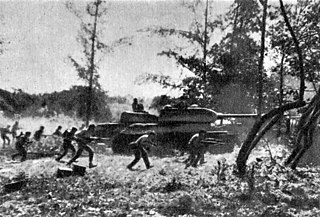
The Bay of Pigs Invasion was a failed military landing operation on the southwestern coast of Cuba in 1961 by the United States of America and the Cuban Democratic Revolutionary Front (DRF), consisting of Cuban exiles who opposed Fidel Castro's Cuban Revolution, clandestinely financed and directed by the U.S. government. The operation took place at the height of the Cold War, and its failure influenced relations between Cuba, the United States, and the Soviet Union.

Félix Ismael Rodríguez Mendigutia is a Cuban American former Central Intelligence Agency Paramilitary Operations Officer in the Special Activities Division, known for his involvement in the Bay of Pigs Invasion and the execution of communist revolutionary Che Guevara as well as his close ties to George H. W. Bush during the Iran–Contra affair.
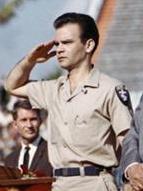
Manuel Francisco Artime Buesa, M.D. was a Cuban-American who at one time was a member of the rebel army of Fidel Castro but later was the political leader of Brigade 2506 land forces in the abortive Bay of Pigs invasion of Cuba in April 1961.
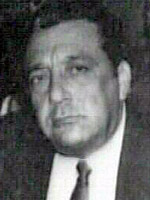
Jose Miguel Battle Sr. was a policeman and Cuban exile who served in the unsuccessful Bay of Pigs Invasion to overthrow the communist Cuban regime in 1961. He later became the nominal leader and founder of The Corporation, also known as the Cuban Mafia, and he invested in the gambling industry in the United States and Peru. He was eventually convicted of racketeering and sentenced to 20 years in prison.
Brigade 2506 was a CIA-sponsored group of Cuban exiles formed in 1960 to attempt the military overthrow of the Cuban government headed by Fidel Castro. It carried out the abortive Bay of Pigs Invasion landings in Cuba on 17 April 1961.
Erneido Andres Oliva Gonzalez was a Cuban-American who was the deputy commander of Brigade 2506 land forces in the abortive Bay of Pigs Invasion of Cuba in April 1961.
Rafael Guas Inclán was a Cuban politician and Vice President of Cuba.

José Alfredo Pérez San Román, better known as Pepe San Román, was a Cuban military officer and the commander of Brigade 2506 ground troops in the Bay of Pigs Invasion of Cuba in April 1961.
Ricardo Miguel Montero Duque is a Cuban exile who was a military battalion commander in the invading forces of Brigade 2506 during the Bay of Pigs Invasion of Cuba in April 1961.
Alfredo Joaquin González Durán is a Cuban-born lawyer and an advocate for dialogue as a way to bring regime change in Cuba. His views are considered controversial in some parts of the Cuban exile community in Miami.

Jeanette Marie Nuñez is an American businesswoman and politician serving as the 20th lieutenant governor of Florida since 2019. A member of the Republican Party, she represented Miami-Dade County in the Florida House of Representatives from 2010 to 2018, also serving as speaker pro tempore for her final two years in the office. Nuñez is the first Latina to serve as Florida lieutenant governor.

Ronald Dion DeSantis is an American politician serving since 2019 as the 46th governor of Florida. A member of the Republican Party, he served as the U.S. Representative from Florida's 6th congressional district from 2013 to 2018. DeSantis was a candidate for the 2024 Republican presidential nomination, withdrawing his candidacy in January 2024.
Victor Andres Triay is a Cuban American historian and writer, known for the books Fleeing Castro: Operation Pedro Pan and the Cuban Children’s Program, Bay of Pigs: An Oral History of Brigade 2506, The Unbroken Circle, and The Mariel Boatlift: A Cuban American Journey.

The 2018 Florida gubernatorial election was held on November 6, 2018, to elect the next governor of Florida, alongside an election to the United States Senate, elections to the United States House of Representatives and other state and local elections. Incumbent two-term Republican governor Rick Scott was term-limited and could not run for a third term, and he successfully ran for Florida's Class I Senate seat.
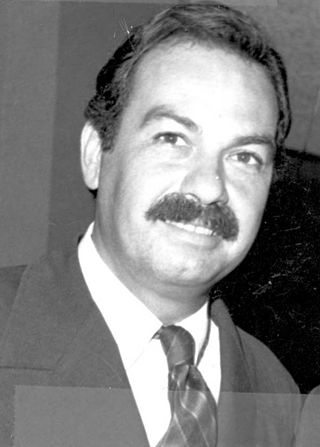
Humberto J. Cortina was an American politician in the state of Florida. He served in the Florida House of Representatives from 1982 to 1984 for the 113th district.
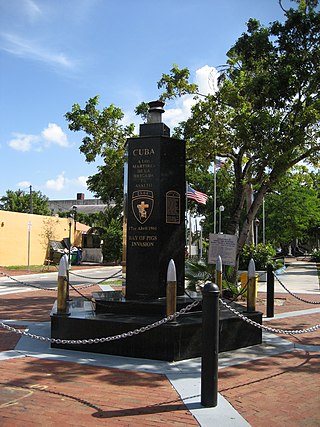
The Bay of Pigs Monument is a monument in honor of the fallen of the Bay of Pigs Invasion in Little Havana, Miami, Florida. Their names are engraved on the monument, and there is an eternal flame at the top. The monument was dedicated on April 17, 1971, by "several hundred Cuban exiles" as well as Miami Mayor David T. Kennedy and then-Senator Lawton Chiles. President Richard Nixon "cabled his best wishes" for the occasion.
Juan Jose Peruyero was a Cuban exile and anti-communist activist. He took part in the Bay of Pigs Invasion in 1961, and he later served as the president of its veteran association in Miami, Florida, where he was assassinated in 1977. He is the namesake of the Juan J. Peruyero Museum and Manuel F. Artime Library in Miami, also known as the Bay of Pigs Museum.

The 2022 Florida gubernatorial election was held on November 8, 2022, to elect the governor of Florida, alongside other state and local elections. Incumbent Republican Party governor Ron DeSantis won re-election in a landslide and defeated the Democratic Party nominee, former U.S. representative Charlie Crist, who previously served as governor of Florida from 2007 to 2011 as a Republican and later as an Independent. No Democrat has been elected governor of Florida since 1994.
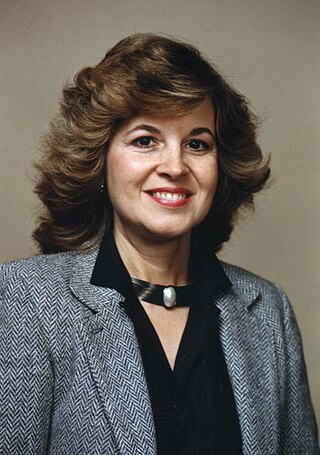
Arnhilda Badia Gonzalez-Quevedo is an American politician in the state of Florida. She served in the Florida House of Representatives between 1984 and 1988.

The notion of Kennedy's betrayal is a certain perspective of the Bay of Pigs Invasion which supposes that President Kennedy's refusal to give proper air support to Brigade 2506, caused the defeat of the invasion. This lack of air support later spurred a sense that John F. Kennedy had betrayed Brigade 2506, and that Cuban exiles immediately started to view him as soft on communism. This soft reputation also supposedly pushed early Cuban exiles to vote Republican in contrast to Kennedy's own Democratic party, creating a long tradition of popular support for the Republican party among Cuban Americans. The supposed immediate distaste for Kennedy among early Cuban exiles has also inspired conspiracy theories that Cuban exiles were involved in Kennedy's assassination.
25°45′54″N80°13′30″W / 25.764989°N 80.225059°W